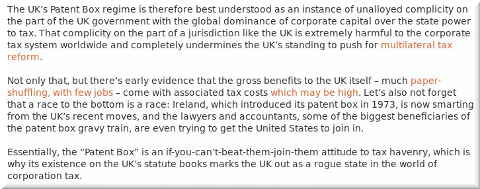
 Reference: "The “Patent Box” – Proof That the UK is a Rogue State in Corporate Tax"
Reference: "The “Patent Box” – Proof That the UK is a Rogue State in Corporate Tax"
TODAY we became aware of this blog post from just two days ago. "USPTO Memo Indicates a ‘European’ Approach to Software Inventions," says the headline, tacitly implying that the EPO is strict on software patents even though the opposite is true (especially in recent years). Lawyers' favourite CAFC cases are presented as evidence. For instance:
Earlier this month, the USPTO issued a memorandum to patent examiners discussing recent court decisions regarding the patentability of software inventions. The memo refers to three federal circuit decisions in which software inventions were found to be eligible for patent protection. The three decisions mentioned in the memo are McRo v. Bandai (Sept. 2016), BASCOM v. AT&T (Jun. 2016) and Amdocs v. Openet (Nov. 2016).
Recently, I summarised the McRo and BASCOM decisions in a blog post for Cambridge Wireless. The Amdocs decision was issued only a day before the USPTO published its memo to examiners on this issue. Therefore, Amdocs is not considered in detail in the memo. However, the USPTO states that further guidance on the Amdocs decision will be given at a later date.
[PDF] was also leaked to us today. The Central Staff Committee is concerned that 15% increase in so-called 'production' results in reductions for staff. Figures are shown to support this claim and also some 'missing money' becomes the subject of inquiry. One has to wonder where all that money comes from and how this so-called 'production' is attained without increases in staffing. Of course, all it means is that patent quality continues to nosedive.
Adoption of legislation for a common consolidated corporate tax base by 27 EU member states would resolve current patent box conflicts and end transfer pricing disputes that cost multinational companies hundreds of millions of dollars in double taxation, according to EU and industry officials.
Speaking at a Nov. 15 conference hosted by the Federation of European Accountants, Uwe Ihli, the chief architect of the October CCCTB proposal unveiled in October, said tax credits for research and development in the pending legislation are seen as a way to prevent harmful tax competition, triggered by the rush to attract investment by high-tech companies via tax breaks on intellectual property profits.
“We believe the research and development tax breaks in the new proposal will not only be a major attraction for businesses but they will also help resolve the divisions in the EU over patent box tax regimes,” Ihli said.
He added that the R&D terms are based on EU state aid rules and in line with the OECD’s modified nexus approach.